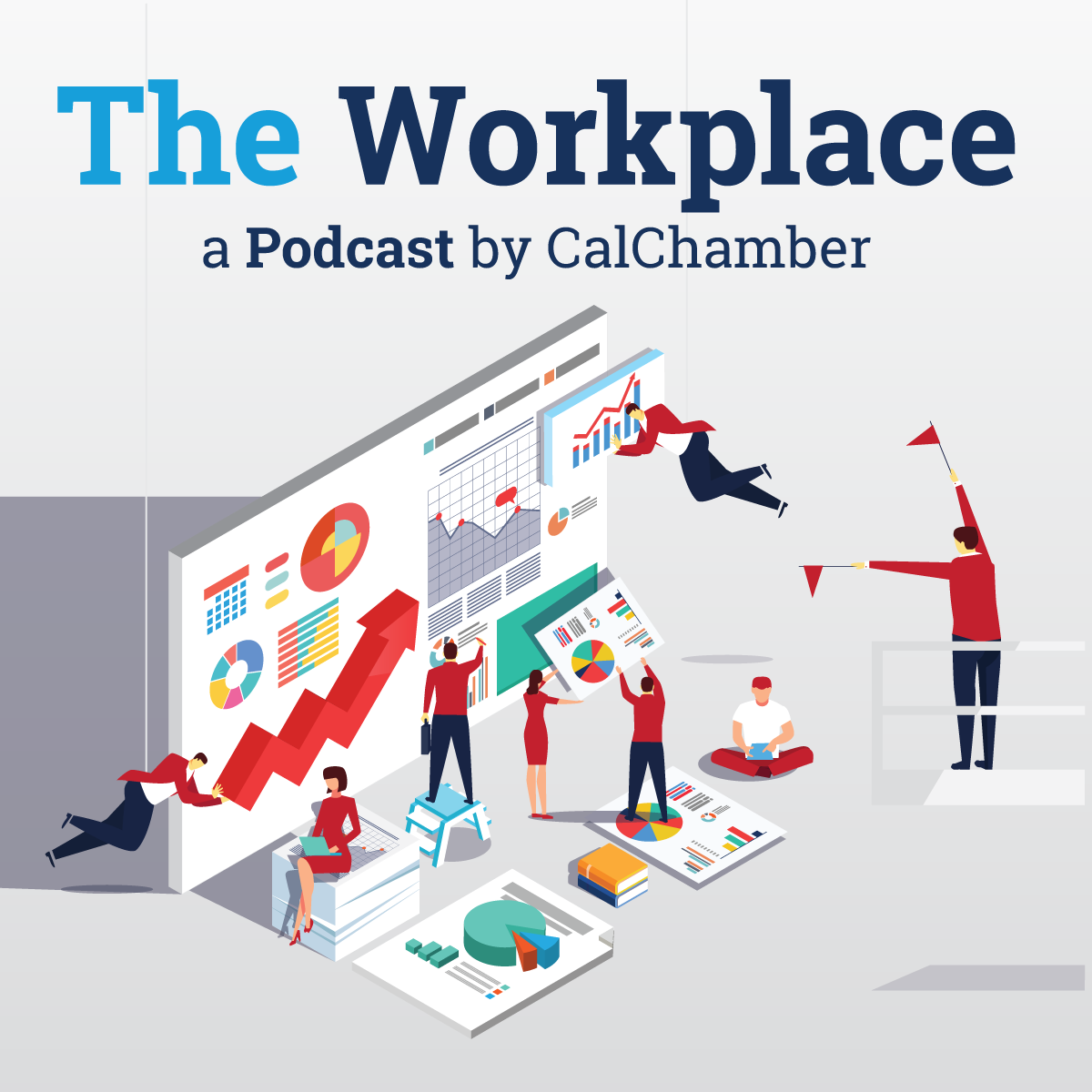 In Episode 110 of The Workplace podcast, CalChamber Executive Vice President and General Counsel Erika Frank and employment law expert Jennifer Shaw discuss what employers should consider before requiring workers to get the COVID-19 vaccine.
In Episode 110 of The Workplace podcast, CalChamber Executive Vice President and General Counsel Erika Frank and employment law expert Jennifer Shaw discuss what employers should consider before requiring workers to get the COVID-19 vaccine.
Note: This podcast was recorded on March 9, 2021. Listeners should be aware that given the unpredictability of the COVID-19 pandemic, information shared on this podcast episode may change at any time.
As COVID-19 vaccines are becoming more widely available, many employers are considering what role they should play, Frank says, and whether they should be just an informational source or actively encourage getting the vaccine.
New Guidance Issued
Employers recently received some clarity on March 4 through the California Department of Fair Employment and Housing (DFEH). The agency published guidance on COVID-19 vaccinations and made it clear that employers can mandate that employees take the COVID-19 vaccine, Shaw explains. So the questions that employers should ask themselves are:
• Does it make sense to establish a mandate for your organization since you will also have to be responsible for providing reasonable accommodations for workers who cannot take the vaccine due to a religious reason or medical condition?
• Should you encourage vaccinations and offer incentives without running afoul of other laws?
Frank encourages all employers to visit the DFEH COVID-19 resource page and download the COVID-19 employment guidance. Written in an FAQ format, it answers many of the questions that employers are currently asking.
Reasonable Accommodations
While employers received the OK to mandate vaccinations, what did the DFEH state about reasonable accommodation obligations, Frank asks Shaw?
The agency took different approaches to employees seeking an accommodation due to a medical disability and due to a religious reason. The DFEH specifically stated that employers cannot segregate employees who need an accommodation due to a religious or practice reason, but the agency did not say the same for those with a medical disability and it’s interesting that the agency took those two approaches, Shaw points out.
The guidance document also contains examples of reasonable accommodations, such as job restructuring, job reassignment or modification of work practices, Frank says.
Vaccine Refusal
What the DFEH does not make clear, Frank says, is what to do if an employee refuses to take the vaccine. The agency states that if there is no sincere religious belief or valid medical condition, then the employer is under no requirement to reasonably accommodate the worker. But then what does an employer do if they encounter resistance? Can the worker be disciplined?
“It’s not that black and white,” Frank points out.
People hold very strong views about vaccines, so it’s going to be hard for employers to not run into reluctance along the way if they choose to mandate vaccinations, Shaw says.
Employers are going to have to be very organized and be really deliberate, with well-written policies and practices because the DFEH does not state whether the employee can be fired or whether they are entitled to leave.
It’s important, Frank stresses, that employers who are going to require vaccinations think about these scenarios ahead of time and talk to their legal counsel.
“We are in uncharted territory,” she says, and there are many liability risks for the employer.
Incentivizing Vaccinations
The DFEH guidance indicates that employers can ask for proof of vaccination, as the vaccination card doesn’t reveal personal medical information, Shaw says. So, it should be easy for employers to identify which employees have been vaccinated and which have not.
Due to the conflict that mandating the vaccine can create, many employers are instead considering incentivizing voluntary vaccinations, Shaw says. For example, a client said their company was going to offer five days of vacation for workers who get vaccinated. But Shaw cautioned the client that the incentive will need to be offered to workers who cannot get the vaccine due to a medical or religious reason. Otherwise, it could be perceived as discrimination.
So if an employer is going to offer an incentive, the employer will need to offer it to everyone, she says.
Employers who are thinking about incentivizing vaccinations should consider this issue and talk to legal counsel, Frank urges. Employers do not have clear rules on whether incentivizing vaccinations is OK, “but there is enough out there to suggest that it’s very risky to do.”
CDC Guidance
Around the time that the DFEH rolled out its guidance, the U.S. Centers for Disease Control and Prevention (CDC) also released more “relaxed rules” regarding quarantining individuals who have been vaccinated, Frank explains. Do these new rules have any impact on California workers right now?
Shaw anticipates that eventually the California Department of Public Health and California Governor’s office will follow the CDC’s rules.
But at the moment, California has not adopted the CDC’s rules and employers in the state will still need to follow the California Division of Occupational Safety and Health (Cal/OSHA) temporary standards, including the workplace safety requirements around masking up at work, social distancing, providing sanitation products and ventilation, Frank adds.
It goes back to every employment law we’ve ever discussed, Shaw says: if you have a federal law and a state law, you should always follow the law that is most protective.
Subscribe to The Workplace
Subscribe to The Workplace on iTunes, Google Podcasts, Stitcher, PodBean and Tune In.
To listen or subscribe, visit www.calchamber.com/theworkplace.

